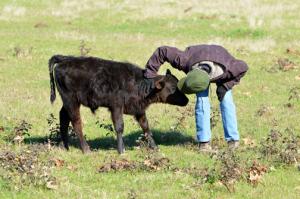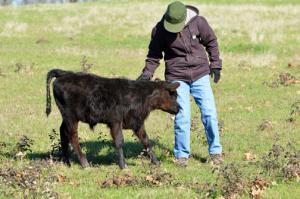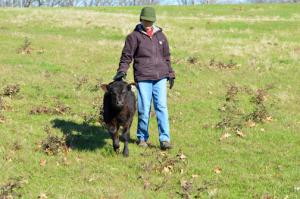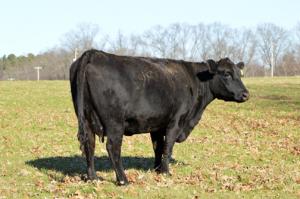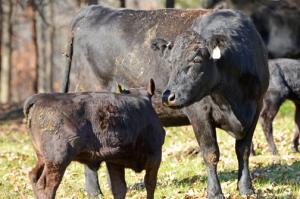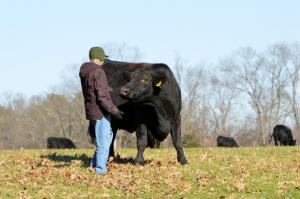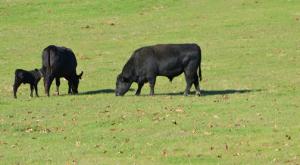By Nancy Brannon
While debate raged in Congress over the “country-of-origin labels” on meat, a law called COOL, there can be no doubt about the origin of beef purchased from Vernon Farms in Lakeland, Tennessee, sold at the Bartlett Station Farmers Market, the Overton Crossing Farmers Market, in Overton Park, Memphis, TN, and sometimes at TSC in Bartlett. The COOL law requires labels on packages of uncooked beef, pork, and poultry sold in grocery stores in the U.S. The labels declare where animals were born, raised, and slaughtered. Emma Vernon doesn’t need such a law because she can tell you all about every cow on the farm. You don’t have to ask, “Where’s the beef?” She knows exactly where it is and where it has been. The Vernons are well-versed in agriculture regulations, and Emma has thoroughly researched the laws regarding beef production. “The Center for Profitable Agriculture was very helpful for the regulatory part,” she said.
Charles and Emma Vernon are the fifth generation of their family to live on this almost 200-acre farm on Cobb Road. Emma keeps meticulous records on their herd of purebred black Angus cattle: when each calf was born, the birth weight, the weaning weight, the yearling weight, when the heifer was bred, when she goes to the bull, and when she is due to calve. She has EPDs (expected progeny differences) on all the livestock, which includes 34 mamma cows; 10 heifers to be bred for the first time; 13 steers in the meat program; 2 bulls; and 31 calves.
Vernon Farms received a Century Farm designation in 1976 and a 150-Year Farm certification around 2001. But the farm has been in their family since their ancestors, the Wiley family, first settled the land in 1829. John Mills Thompson and his wife Martha Wiley settled here and built their first house on the farm, likely a two-room house. Through the years it was expanded to accommodate more family members. John Mills and Martha had a son, William Perry Thompson, who married Julia Ann Whitehurst. Their son, Charles Leland Thompson married Mary Edna Jones, and they had a child, Mary Dorcas Thompson. Mary was Charles’ mother, and Charles is the eldest son of Mary and Bruce Vernon, from whom the farm takes its current name. Now Charles and Emma are the proprietors of Vernon Farms, sharing equally all the farm work. The couple also have another farm on Pisgah Road in Cordova, TN that was in Emma’s family. Emma is the third generation owner of that farm.
There’s a small barn on the property that was built from the planks that made Stage Road, back when it was a plank road. “When they tore up the plank road to make it a gravel road, they got the old planks and built a barn with them,” Charles explained. This was sometime between 1900 and 1919. Bartlett was the last major way station in Tennessee along the stagecoach route from Nashville westward and came into being about 1829. This was a farming community, with major plantations along Stage Road.
From 1972 to 1992 the Vernon’s Lakeland farm was in row crops, but they put cattle back in the farm in 1992. Since then they have concentrated on developing their herd to produce the best, most tender beef possible. All their cows are grass fed, and in the last three months before they are sent to the meat processor, they add some grain to the cows’ diet. The beef is harvested under USDA inspection and dry-aged for three weeks at a nearby processing plant that handles the meat in the traditional, time-honored way. “We don’t ‘push’ the meat,” Emma explained. “We let the animals get ready as nature intended. We take very good care of our animals, and some are treated like part of the family!”
Such members of the family include Roscoe, an orphan calf that they bottle fed. Then there’s Baby Huey, named because he was so big when he was born. Then there’s Do-All #108, who accidently once got her foot caught in the Do-All. That was quite a task to get her foot removed and do minimal damage!
The Vernons make sure they have good pasture for their cows year-round. For winter pasture, they drilled some fescue and seeded winter rye. They put a lot of organic matter on their fields to maintain fertility, plus they utilize clovers to add nitrogen ‘fertilizer’ to their grass. They have a variety of clovers, and like the Korean lespedeza because it can survive the summer droughts. They also raise their own hay from fields where they grow two types of Bermuda.
Their land care ensures there’s plenty of wildlife on the farm, too. Even though there are officially “no panthers in Tennessee,” Charles had seen panthers on his farm several times, and definitely heard their loud screams. One bird that they have to be wary of is the turkey vulture, also called buzzard. These birds have been known to kill a newborn calf. So to protect their newborns, the Vernons have set up a “maternity pen,” where they put the cows about a week before they calve. Besides, Emma likes to keep a close watch on her cows anyway. In fact, when any of the cows or calves are in trouble and need help, they literally come to get one of the Vernons.
Protecting their land in perpetuity is very important to the Vernons, and they have set up their wills to ensure that the land will never be developed and will remain farmland for generations to come. “We were here before there even was a Lakeland,” Emma said. Their land is currently in the Greenbelt zone. They have set up a living trust in which their land will become a qualified charitable trust after the Vernons pass away. “The land will be maintained in a ‘conservation easement’ type manner,” Emma said. The land will not be developed, but will remain farm land in perpetuity. There will be money going into the trust to maintain the land.
For more information about Vernon Farms Beef, visit their website: vernonfarms.com.
